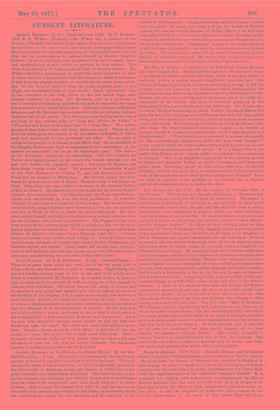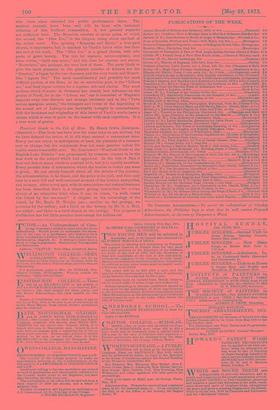Messa da Requiem. Di G. Verdi. (Ricordi, Milano; and 28
Charles Street, London.)—This handsomely-printed edition of Verdi's famous "Requiem Mass" in honour of Manzoni was produced in England in time to give the lovers of music an opportunity of studying, or at least looking over the work before its public performance at the Albert Hall, under the superintendence of the celebrated composer himself. It is arranged for singing with a pianoforte accompaniment by Signor Michele SaLadino, who has done his work well. It is by no means an easy task to give the effect of such complicated orchestral music on the piano, as may be imagined by those who were present at the private performance of the work at the Albert Hall and those
who have since attended the public performance there. The musical journals have been and will be busy with technical criticism of this brilliant composition. A few general remarks are sufficient here. The Requiem consists of seven parts, of which the second, the "Dies Ira3," is the longest, being about one-half of the entire work. The opening "Requiem and Kyrie," a four-part chorus, is impressive, but is marked by Verdi's latest style less than the rest of the work. The "Dies Ira3" is a grand chorus, with solo parts of great beauty. The trio for soprano, mezzo-soprano, and tenor voices, "Quid sum miser," and the duet for soprano and mezzo, " Recordare," are, perhaps, the very best of these. The parts likely to give the most pleasure to the greatest number of hearers are the "Sanctus," a fugue by the two choruses, and the very lovely and Mozart- like " Agnns Del" The most unsatisfactory and probably the most difficult portion of the Mass, as far as execution goes, is the "Libera me," and final fugue written for a soprano solo and chorus. The most modern school of music in Germany has clearly had influence on the genius of Verdi, for in the " Libera me" one is reminded of Wagner's imperial sway over discords and strange contrasts, and in the "Tuba mirum spargens !mum," the trumpets and horns of the beginning of the second act of Lohengrin are inevitably brought to remembrance. Still the freshness and originality of this latest of Verdi's works have a charm which is sure to grow on the hearer with each repetition. It is a true work of genius.



































 Previous page
Previous page